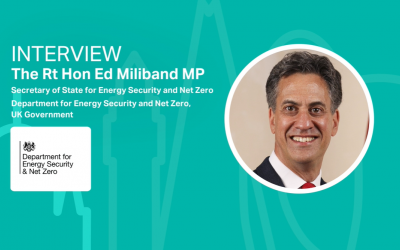Partnership matters when benchmarking climate change
Aled Jones, Head of EMEA Sustainable Investment Products at FTSE Russell on why partnerships matter when benchmarking climate change.
_1000_563_80.jpg)
The UK currently offers an example of what happens when those in charge of an economy are unable to stick to a clear plan. Markets wobble, investment flows dry up and consumer confidence suffers.
In our business—the provision of indices and benchmarks, together with the associated data and analytics—planning and partnership are increasingly important. And that’s particularly true when it comes to sustainable investment (SI).
SI is the new normal; sustainability now comes up in almost every client discussion we have at FTSE Russell. And that often requires detailed thinking about index design.
Take our collaborative work with the Church of England (CoE) Pensions Board as an example.
In 2018 the Pensions Board came to us to ask if we could build the data coming out of the Transition Pathway Initiative (TPI) into a climate-focused index, as it wanted to decarbonise its passive equity portfolio in line with commitments made by the trustees.
FTSE Russell is the data provider to TPI, a global initiative led by asset owners. It assesses how individual companies are positioning themselves for the transition to a low-carbon economy.
The Church of England (CoE) Pensions Board is co-chair of the TPI (with the Environment Agency Pension Fund).
Following the request, we spent about 18 months in a very close working relationship with the specialists at the Church’s Pensions Board, starting with a blank sheet of paper. We iterated until we came up with an index design that we could build into a live product.
The end-result—the FTSE TPI Climate Transition index—captures companies’ exposure to five climate change parameters. Three of these – fossil fuel reserves, carbon emissions and green revenues – were taken from FTSE Russell’s existing climate framework which is applied to e.g. our Global Climate and (separately) Smart Sustainability Index Series. Working with the Pensions Board we developed an expanded climate framework that captures elements of the low carbon transition by integrating the TPI company assessments – Management Quality and Carbon Performance – into the index design.
The TPI Climate Transition Index takes a deliberately non-exclusionary approach, but it cut the carbon intensity of the Church’s passive equity portfolio by nearly half. The Church Pensions Board decided to allocate £600m of its overall passive equity allocation to a fund tracking the new index.
Earlier this year we undertook a similar collaborative project with the Japan Exchange Group (JPX), launching two new indices, the FTSE JPX Net Zero Japan 500 Index and FTSE JPX Net Zero Japan 200 Index.
Both adhere to the EU's Climate Transition Benchmark (CTB) standards, which enable investors to reallocate capital based on the climate credentials and carbon performance of the constituent companies in the index.
These new indices are particularly topical, because despite the growing number of Japanese companies declaring their commitments to a net zero greenhouse gas emissions target by 2050, many investors say greater specificity is needed over how these goals will be achieved.
Our partnership initiatives extend beyond the equity markets. In 2019 we started working with Beyond Ratings, a specialist provider of environmental, social and governance (ESG) data, to build a sovereign debt index that incorporated climate risk assessments (Beyond Ratings was later acquired by the London Stock Exchange Group, FTSE Russell’s parent com555pany).
The outcome of our collaboration was the FTSE Climate Risk-Adjusted Government Bond Index Series, a novel adaptation of the nearly four-decades-old FTSE World Government Bond Index (WGBI).
The new climate risk index incorporated quantitative assessments across three pillars: transition risk (the climate-related risk exposure of a country’s economy); physical risk (the risk exposure to a country and its economy from the physical effects of climate change); and resilience (a country’s preparedness to cope with its level of climate-related risk exposure).
You can find a full exposition of how we measure climate risk in sovereign fixed income markets in three FTSE Russell research papers.
The key thing for me about this fixed income market project is that the index helped solve a climate investment challenge that no-one had really looked at before.
It started with intellectual curiosity—it was only later that we saw interest from asset managers in building investment products to replicate the index.
These examples illustrate a broader point. Some of the most successful ESG or SI products—those that have attracted significant levels of client interest—have come about as the result of a collaboration between a benchmark provider and an asset owner or asset manager.
No-one necessarily takes the full credit for these projects, because no-one has a monopoly on good ideas. Our view is that if we can partner with a client or interested third party, we're more likely to build something together that will be successful.
In sustainable investment this is particularly true as approaches are constantly evolving. From the perspective of a benchmark provider, we need to make sure we are very clear about what we are doing and why.
What attracts people to working with us? I’d say it's probably because we're flexible and we like to work closely with clients to deliver index products that cater to their needs. It also helps that we have a strong bench of internal Climate, ESG and asset class experts that collaborate to integrate new ideas and datasets into our core benchmarks across equities, fixed income, real estate and infrastructure.
When we sit down with clients, we bring significant knowledge and insights to the table and this resonates with them. Ultimately clients are looking for a partner to help them solve the challenge of incorporating ESG and Climate objectives into their investment strategy and asset allocation.
The future of investment is sustainable investment. Discover more about how FTSE Russell is combining expert data capabilities and a multidisciplinary team of thought leaders to drive innovation through our multi-asset class indexes, analytics and research, helping you to share your sustainable investment strategies. Discover more.
© 2022 London Stock Exchange Group plc (the “LSE Group”). All information is provided for information purposes only. Such information and data is provided “as is” without warranty of any kind. No member of the LSE Group make any claim, prediction, warranty or representation whatsoever, expressly or impliedly, either as to the accuracy, timeliness, completeness, merchantability of any information or of results to be obtained from the use of FTSE Russell products or the fitness or suitability of the FTSE Russell products for any particular purpose to which they might be put. Any representation of historical data accessible through FTSE Russell products is provided for information purposes only and is not a reliable indicator of future performance. No member of the LSE Group provide investment advice and nothing contained in this document or accessible through FTSE Russell products should be taken as constituting financial or investment advice or a financial promotion. Use and distribution of the LSE Group data requires a licence from an LSE Group company and/or their respective licensors.



_400_250_s_c1.png)


